Fast Facts
Location
This course may require some on-campus attendance
Commencing
- Online: February, July
Fees
$33,907.00^
^estimated annual tuition fee for a full-time study load
Plus Student Services and Amenities feeFee deferral and scholarships available if eligible
Currently displaying fees for 2025, which are subject to change in following years.
Duration
1.5 years full-time
Entry Requirements
AQF level 7 bachelor degree in a relevant health discipline; or B Physiotherapy, B Occupational Therapy, or B Speech Pathology
Course Code
114804
Course detail
Enhance your career in rehabilitation and health promotion with JCU’s Master of Rehabilitation. Advance your ability to design, manage, and evaluate rehabilitation plans for individuals and communities in culturally diverse populations. You will learn to develop solutions for complex issues in rehabilitation and develop the skills to make a difference in regional, rural, remote and Indigenous communities.
This Master of Rehabilitation degree is designed to maximise your professional expertise and extend your capacity in key areas of rehabilitation. You will choose from two streams — coursework or coursework and research — to build specialist knowledge, skills, and technical capability across a range of health contexts. In each stream, you will gain a broad understanding of rehabilitation and important topics including chronic conditions, evidence-based practice, and cultural practice.
The coursework stream will build your knowledge and technical understanding of areas including lifestyle medicine, health coaching and behaviour change, models of care, education for the health professional, advanced practice in a rural and remote context, rehabilitation for disability and palliative care.
The research stream incorporates two main subjects, with the first focusing on an extensive literature review and the second comprising the main portion of the research project. Your research project will investigate an issue or topic relevant to rehabilitation and the allied health sector. Undertaking this research project can open doors to a future PhD.
Tailor the Master of Rehabilitation to suit your interests, experience and career goals by choosing from one of four majors: General Major in Rehabilitation, Occupational Therapy, Physiotherapy and Speech Pathology.
Consult the handbook for more information.
Additional information
Master’s Degree in Rehabilitation
If you want a rewarding and challenging career working with and helping people, becoming a Master of Rehabilitation can be right for you. With this degree, you can become a fully qualified physiotherapist, occupational therapist or speech therapist, allowing you to make a tangible difference in people’s lives and work in a field you feel passionate about. Studying at JCU will provide you with expertise targeted toward helping communities in the Tropics, in particular, as well as improving the health and wellbeing of people all over Australia. With a course that you can study online there are few better options for rehabilitation than JCU. Learn all the skills you need to become employable in the field you choose and succeed in your new career by studying for the JCU master’s degree in rehab.
The Majors
The field of rehabilitation is wide and the JCU Master of Rehabilitation degree offers you the opportunity to choose a major that aligns with your interests and career goals.
- General Major in Rehabilitation: This major enables you to help people recover from illness and injury and support them in their everyday life. It will provide you with plenty of new knowledge, skills and evidence-based practice to implement into your current practice.
- Occupational Therapy: Occupational therapists help people improve their ability to perform everyday tasks they struggle with due to disability, illness and injury. This also includes people with mental health difficulties or learning disabilities, as well as the elderly. It’s the perfect career path for those who care about helping others and want to empower them to live their lives independently.
- Physiotherapy: The physiotherapy major is meant to enhance your existing qualifications as a physiotherapist, providing you with even more skills to help clients rehabilitate from injuries and illness.
- Speech Pathology: Speech pathologists assist individuals of all ages who have difficulties with communication or swallowing. Studying speech pathology provides you with advanced skills to support clients and empower them to communicate.
What You Will Learn
Studying for the master’s degree in Rehabilitation at JCU will provide you with a variety of useful skills that enable you to pursue a rewarding career in one of the fields described. You will gain the ability to design, manage and evaluate rehabilitation plans and learn how to work with culturally diverse populations, developing complex solutions for rehabilitation and maximising your professional expertise. You will gain a broad understanding of rehabilitation, chronic conditions, evidence-based practice and more. You will choose between coursework or coursework and research depending on your own aspirations.
Why Study a Master of Rehabilitation at JCU in QLD?
JCU rehabilitation graduates see great career outcomes and are highly employable. You will benefit from high-quality teaching and excellent learning resources. The master's degree in rehabilitation is taught entirely online, making it a flexible option you can complete from anywhere in the country from the comfort of your own home. Set yourself up for success by choosing JCU and applying for the master’s degree in rehab through the online application portal.
Hide additional information
Inherent requirements
Inherent requirements are the identified abilities, attributes, skills, and behaviours that must be demonstrated, during the learning experience, to successfully complete a course. These abilities, attributes, skills, and behaviours preserve the academic integrity of the University’s learning, assessment, and accreditation processes, and where applicable, meet the standards of a profession. For more information please review the inherent requirements for the Master of Rehabilitation.
Majors
General Major in Rehabilitation
Take the General Major in Rehabilitation to advance your career. Learn high-level skills to enable individuals to rehabilitate from illness and injury. Your advanced skillset will equip you for a range of roles to support clients in their daily life. Implement evidence-based practice by integrating your new knowledge and skills into your current practice.
Occupational Therapy
Choose the Occupational Therapy Major with a specialisation in rehabilitation for a highly valued qualification. Advance your skillset and successfully assist individuals in overcoming barriers that impair activities of daily living.
Physiotherapy
Major in Physiotherapy with a specialisation in rehabilitation to enhance your existing qualifications. Deepen your knowledge and advance your skills to successfully assist clients with their rehabilitation journey.
Speech Pathology
Gain advanced skills with the Speech Pathology Major. Assist individuals of all ages with communication and swallowing-related issues. Build your career and support clients through their rehabilitation and day-to-day life.
Grow your career in rehabilitation with the Master of Rehabilitation at JCU. Benefit from unique experiences in tropical, rural, remote, and regional areas and familiarity with Indigenous communities and their health.
JCU’s Master of Rehabilitation gives you the contemporary knowledge, skills and experience to update your clinical practice and expand your career prospects. You will gain advanced skills in your specialisation and valuable expertise in tropical, Indigenous, rural, and remote practice.
Graduates pursue careers in various areas including acute wards and rehabilitation settings with public and private health providers, aged care, private practice, policy development, or research. You could pursue your specialisation in roles such as clinician, case manager, or researcher. Additionally, you progress further to study a PhD.
Estimated annual tuition fee: $AUD33,907.00
A variety of Scholarships are available to suit different student types.
Learn more about fees and financial support
Complete an online application through our Online Application Portal.
Real stories
-
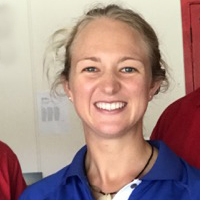
Student
Tamara Matulick
Master of Rehabilitation
Doing the Master of Rehabilitation will help with career progression — especially in getting jobs I wouldn’t otherwise be able to get. You have to manage your time between work and study, but I think you’re more motivated as a learner because you’ve had situations where you can apply your experience and knowledge to.
-
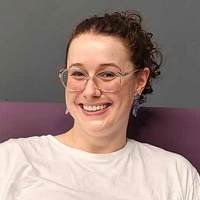
Alumni
Kestin Roberts
Master of Rehabilitation
I chose JCU due to the flexibility of completing it fully online. Working full-time while completing the course was a highlight for me, as I could take things I was learning within my course and immediately implement them in my current practice with clients.
-
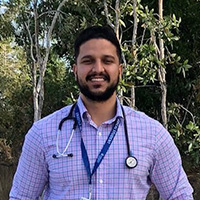
Alumni
Daniel Behary
MBBS Student (JCU), MRehab (JCU), BPhty (USYD)
What inspired me to undertake Master of Rehabilitation at James Cook University is my passion for Interventional Cardiology and interest in Medical research. This course offered me the opportunity to explore the benefits of cardiopulmonary rehabilitation which is often required for patients with advanced heart disease.
-
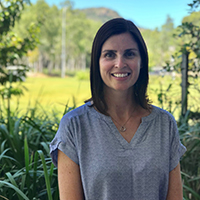
Lecturer
Moira Smith
Course Coordinator, Rehabilitation
The Master of Rehabilitation is an exciting pathway in your healthcare career. There is a great variety of subjects to help upskill in the area of rehabilitation, addressing perspectives from many different disciplines. Whatever your aim, this course will assist the development of your skill set in rehabilitation.
-
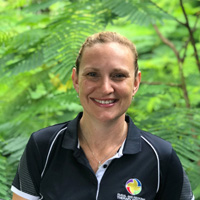
Employer
Kathy Luke
RAR Therapy Director
This course provides practical and evidence-based clinical skills that apply to the community work environment and ultimately benefit our clients. With an increased need for highly skilled therapists in community settings, this course is perfect for extending therapists’ knowledge and skills for clinical practice.